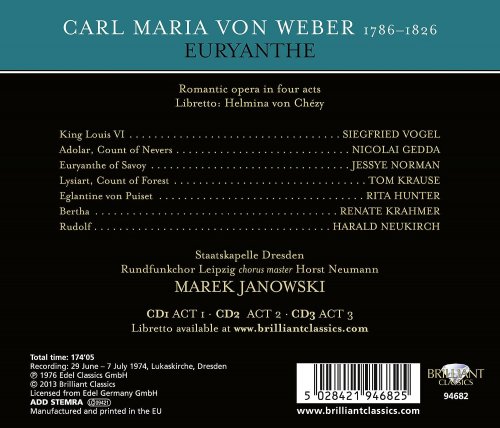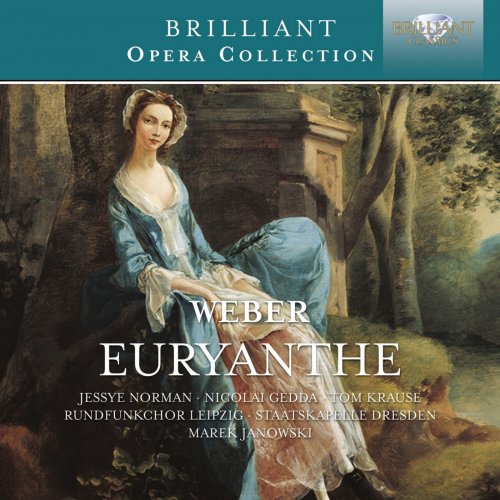
Nicolai Gedda, Jessye Norman, Tom Krause, Rundfunkchor Leipzig, Horst Neumann, Staatskapelle Dresden, Marek Janowski - Weber: Euryanthe (2013)
BAND/ARTIST: Nicolai Gedda, Jessye Norman, Tom Krause, Rundfunkchor Leipzig, Horst Neumann, Staatskapelle Dresden, Marek Janowski
- Title: Weber: Euryanthe
- Year Of Release: 2013
- Label: Brilliant Classics
- Genre: Classical
- Quality: flac lossless (tracks)
- Total Time: 02:54:08
- Total Size: 717 mb
- WebSite: Album Preview
Tracklist
01. Euryanthe: Ouvertüre
02. Euryanthe, Act I: No. 1. Introduktion "Dem Frieden Heil!" (Chor)
03. Euryanthe, Act I: "Ernster Reigen"
04. Euryanthe, Act I: Rezitativ "Mein Adolar! So fern dem heitern Reigen?" (König, Adolar, Lysiart)
05. Euryanthe, Act I: No. 2. Romanze "Unter blüh'nden Mandelbäumen" (Adolar)
06. Euryanthe, Act I: No. 3. Chor "Heil Euryanth', der Lieblichsten der Schönen!" - Rezitativ. "Ich trag' es nicht!" (Lysiart, Adolar, König)
07. Euryanthe, Act I: No. 4. Terzett mit Chor "Wohlan! Du kennst mein herrlich Eigentum" (Lysiart, Adolar, König, Männerchor)
08. Euryanthe, Act I: No. 5. Kavatine "Glöcklein im Tale" (Euryanthe)
09. Euryanthe, Act I: Rezitativ "So einsam bangend find' ich dich?" (Eglantine, Euryanthe)
10. Euryanthe, Act I: No. 6. Arie "O mein Leid ist unermessen" (Eglantine)
11. Euryanthe, Act I: Rezitativ "Freundin! Geliebte! An meine Brust" (Euryanthe, Eglantine)
12. Euryanthe, Act I: No. 7. Duett "Unter ist mein Stern gegangen" (Euryanthe, Eglantine)
13. Euryanthe, Act I: No. 8. Rezitativ und Arie "Betörte, die an meine Liebe glaubt" - "Er konnte mich um sie verschmähn!" (Eglantine)
14. Euryanthe, Act I: No. 9. Finale "Jubeltöne, Heldensöhne" (Chor, Euryanthe, Eglantine, Lysiart)
15. Euryanthe, Act I: No. 9. Finale "Fröhliche Klänge, Tänze, Gesänge" (Euryanthe, Chor, Eglantine, Rudolf, Lysiart)
16. Euryanthe, Act II: No. 10. Szene und Arie "Wo berg' ich mich?" - "Schweigt, glüh'nden Sehnens wilde Triebe" (Lysiart)
17. Euryanthe, Act II: No. 11. Rezitativ "Der Gruft entronnen, atm' ich wieder" (Eglantine, Lysiart)
18. Euryanthe, Act II: No. 11. Duett "Komm denn, unser Leid zu rächen!" (Eglantine, Lysiart)
19. Euryanthe, Act II: No. 12. Arie "Wehen mir Lüfte Ruh'" (Adolar)
20. Euryanthe, Act II: No. 13. Duett "Hin nimm die Seele mein" (Euryanthe, Adolar)
21. Euryanthe, Act II: No. 14. Finale "Leuchtend füllt die Königshallen" (Männerchor, König, Euryanthe, Lysiart, Adolar)
22. Euryanthe, Act II: No. 14. Finale "Laß mich empor zum Lichte wallen" (Euryanthe, König, Lysiart, Adolar, Männerchor)
23. Euryanthe, Act II: No. 14. Finale "Verleih mein Recht mir" (Lysiart, König, Adolar, Euryanthe, Männerchor)
24. Euryanthe, Act III: No. 15. Rezitativ "Hier weilest du? Hier darf ich ruh'n?" (Euryanthe, Adolar)
25. Euryanthe, Act III: No. 15. Duett "Wie liebt ich dich" (Adolar, Euryanthe)
26. Euryanthe, Act III: No. 16. Arioso und Szene "Schirmende Engelschar" (Euryanthe, Adolar)
27. Euryanthe, Act III: No. 17. Rezitativ "So bin ich nun verlassen" (Euryanthe)
28. Euryanthe, Act III: No. 17. Kavatine "Hier dicht am Quell" (Euryanthe)
29. Euryanthe, Act III: No. 18. Jägerchor "Die Tale dampfen, die Höhen glüh'n" (Männerchor) - Rezitativ "O seht! Die Schlang' erlegt von starker Hand!" [König, Männerchor]
30. Euryanthe, Act III: No. 19. Duett mit Chor "Laßt mich hier in Ruh' erblassen" (Euryanthe, König, Männerchor)
31. Euryanthe, Act III: No. 20. Arie mit Chor "Zu ihm! O weilet nicht!" (Euryanthe, Männerchor)
32. Euryanthe, Act III: No. 21. Szene mit Chor "Pas de cinq" (Ballettmusik)
33. Euryanthe, Act III: No. 21. Szene mit Chor "Der Mai bringt frische Rosen dar" (Chor, Bertha, Rudolf, Adolar)
34. Euryanthe, Act III: No. 22. Solo mit Chor "Vernichte kühn das Werk der Tücke" (Chor, Adolar)
35. Euryanthe, Act III: No. 23. Hochzeitsmarsch, Szene und Chor "Das Frevlerpaar! Weh diesem Bunde!" (Chor, Adolar, Eglantine, Lysiart)
36. Euryanthe, Act III: No. 24. Duett mit Chor "Trotze nicht! Vermessener!" (Chor, Lysiart, Adolar)
37. Euryanthe, Act III: No. 25. Finale "Laßt ruh'n das Schwert!" (König, Adolar, Eglantine, Chor, Lysiart, Euryanthe)
38. Euryanthe, Act III: No. 25. Finale, Duett mit Chor "Hin nimm die Seele mein" (Euryanthe, Adolar, Chor)

A careful blend of recitative, arioso and set piece, Euryanthe was Carl Maria von Weber’s second opera, first performed in 1823 (two years after the premiere of Der Freischütz) and based on an early 13th-century French romance with a libretto by Helmina von Chézy – the eccentric author of Schubert’s five-act Rosamunde.
The work is largely based on the then common opera theme of a husband driven to test his wife’s fidelity. Lysiart, Adolar’s secret rival, boasts that he can lead the latter’s betrothed Euryanthe astray – a claim to which each reacts by staking all his possessions on the outcome. Lysiart appears to have triumphed when Eglantine, jealously in love with Adolar, manages to unlock from Euryanthe a secret concerning Adolar’s dead sister, who will not find rest until the ring from which she drank poison is wet with tears; Adolar, distraught, abandons Euryanthe and gives up all his possessions. Things take a turn for the better, however, when Eglantine’s betrayal is uncovered by the king and his hunting party, who stumble upon an exhausted Euryanthe after she has just saved Adolar from a huge serpent. Alleging that Euryanthe has died, the king guilt-trips Eglantine at the ensuing peasant wedding into confessing her crime, whereupon she is fatally stabbed by an enraged Lysiart. Adolar is crazed with grief, but at this moment Euryanthe enters and the two are happily reunited.
Rarely staged because of its weak libretto, Euryanthe is nevertheless a groundbreaking work due to its repeated use of chromaticism for depicting evil characters – Weber was well ahead of his time in this respect, as music history would have to wait another 40 years before Wagner pursued the ‘dissolution of tonality’ on a similar scale in Tristan und Isolde. This recording, made in 1974, features a stellar cast (Nicolai Gedda and Jessye Norman sing the roles of Adolar and Euryanthe respectively) and is directed by esteemed Polish-born conductor Marek Janowski.
01. Euryanthe: Ouvertüre
02. Euryanthe, Act I: No. 1. Introduktion "Dem Frieden Heil!" (Chor)
03. Euryanthe, Act I: "Ernster Reigen"
04. Euryanthe, Act I: Rezitativ "Mein Adolar! So fern dem heitern Reigen?" (König, Adolar, Lysiart)
05. Euryanthe, Act I: No. 2. Romanze "Unter blüh'nden Mandelbäumen" (Adolar)
06. Euryanthe, Act I: No. 3. Chor "Heil Euryanth', der Lieblichsten der Schönen!" - Rezitativ. "Ich trag' es nicht!" (Lysiart, Adolar, König)
07. Euryanthe, Act I: No. 4. Terzett mit Chor "Wohlan! Du kennst mein herrlich Eigentum" (Lysiart, Adolar, König, Männerchor)
08. Euryanthe, Act I: No. 5. Kavatine "Glöcklein im Tale" (Euryanthe)
09. Euryanthe, Act I: Rezitativ "So einsam bangend find' ich dich?" (Eglantine, Euryanthe)
10. Euryanthe, Act I: No. 6. Arie "O mein Leid ist unermessen" (Eglantine)
11. Euryanthe, Act I: Rezitativ "Freundin! Geliebte! An meine Brust" (Euryanthe, Eglantine)
12. Euryanthe, Act I: No. 7. Duett "Unter ist mein Stern gegangen" (Euryanthe, Eglantine)
13. Euryanthe, Act I: No. 8. Rezitativ und Arie "Betörte, die an meine Liebe glaubt" - "Er konnte mich um sie verschmähn!" (Eglantine)
14. Euryanthe, Act I: No. 9. Finale "Jubeltöne, Heldensöhne" (Chor, Euryanthe, Eglantine, Lysiart)
15. Euryanthe, Act I: No. 9. Finale "Fröhliche Klänge, Tänze, Gesänge" (Euryanthe, Chor, Eglantine, Rudolf, Lysiart)
16. Euryanthe, Act II: No. 10. Szene und Arie "Wo berg' ich mich?" - "Schweigt, glüh'nden Sehnens wilde Triebe" (Lysiart)
17. Euryanthe, Act II: No. 11. Rezitativ "Der Gruft entronnen, atm' ich wieder" (Eglantine, Lysiart)
18. Euryanthe, Act II: No. 11. Duett "Komm denn, unser Leid zu rächen!" (Eglantine, Lysiart)
19. Euryanthe, Act II: No. 12. Arie "Wehen mir Lüfte Ruh'" (Adolar)
20. Euryanthe, Act II: No. 13. Duett "Hin nimm die Seele mein" (Euryanthe, Adolar)
21. Euryanthe, Act II: No. 14. Finale "Leuchtend füllt die Königshallen" (Männerchor, König, Euryanthe, Lysiart, Adolar)
22. Euryanthe, Act II: No. 14. Finale "Laß mich empor zum Lichte wallen" (Euryanthe, König, Lysiart, Adolar, Männerchor)
23. Euryanthe, Act II: No. 14. Finale "Verleih mein Recht mir" (Lysiart, König, Adolar, Euryanthe, Männerchor)
24. Euryanthe, Act III: No. 15. Rezitativ "Hier weilest du? Hier darf ich ruh'n?" (Euryanthe, Adolar)
25. Euryanthe, Act III: No. 15. Duett "Wie liebt ich dich" (Adolar, Euryanthe)
26. Euryanthe, Act III: No. 16. Arioso und Szene "Schirmende Engelschar" (Euryanthe, Adolar)
27. Euryanthe, Act III: No. 17. Rezitativ "So bin ich nun verlassen" (Euryanthe)
28. Euryanthe, Act III: No. 17. Kavatine "Hier dicht am Quell" (Euryanthe)
29. Euryanthe, Act III: No. 18. Jägerchor "Die Tale dampfen, die Höhen glüh'n" (Männerchor) - Rezitativ "O seht! Die Schlang' erlegt von starker Hand!" [König, Männerchor]
30. Euryanthe, Act III: No. 19. Duett mit Chor "Laßt mich hier in Ruh' erblassen" (Euryanthe, König, Männerchor)
31. Euryanthe, Act III: No. 20. Arie mit Chor "Zu ihm! O weilet nicht!" (Euryanthe, Männerchor)
32. Euryanthe, Act III: No. 21. Szene mit Chor "Pas de cinq" (Ballettmusik)
33. Euryanthe, Act III: No. 21. Szene mit Chor "Der Mai bringt frische Rosen dar" (Chor, Bertha, Rudolf, Adolar)
34. Euryanthe, Act III: No. 22. Solo mit Chor "Vernichte kühn das Werk der Tücke" (Chor, Adolar)
35. Euryanthe, Act III: No. 23. Hochzeitsmarsch, Szene und Chor "Das Frevlerpaar! Weh diesem Bunde!" (Chor, Adolar, Eglantine, Lysiart)
36. Euryanthe, Act III: No. 24. Duett mit Chor "Trotze nicht! Vermessener!" (Chor, Lysiart, Adolar)
37. Euryanthe, Act III: No. 25. Finale "Laßt ruh'n das Schwert!" (König, Adolar, Eglantine, Chor, Lysiart, Euryanthe)
38. Euryanthe, Act III: No. 25. Finale, Duett mit Chor "Hin nimm die Seele mein" (Euryanthe, Adolar, Chor)

A careful blend of recitative, arioso and set piece, Euryanthe was Carl Maria von Weber’s second opera, first performed in 1823 (two years after the premiere of Der Freischütz) and based on an early 13th-century French romance with a libretto by Helmina von Chézy – the eccentric author of Schubert’s five-act Rosamunde.
The work is largely based on the then common opera theme of a husband driven to test his wife’s fidelity. Lysiart, Adolar’s secret rival, boasts that he can lead the latter’s betrothed Euryanthe astray – a claim to which each reacts by staking all his possessions on the outcome. Lysiart appears to have triumphed when Eglantine, jealously in love with Adolar, manages to unlock from Euryanthe a secret concerning Adolar’s dead sister, who will not find rest until the ring from which she drank poison is wet with tears; Adolar, distraught, abandons Euryanthe and gives up all his possessions. Things take a turn for the better, however, when Eglantine’s betrayal is uncovered by the king and his hunting party, who stumble upon an exhausted Euryanthe after she has just saved Adolar from a huge serpent. Alleging that Euryanthe has died, the king guilt-trips Eglantine at the ensuing peasant wedding into confessing her crime, whereupon she is fatally stabbed by an enraged Lysiart. Adolar is crazed with grief, but at this moment Euryanthe enters and the two are happily reunited.
Rarely staged because of its weak libretto, Euryanthe is nevertheless a groundbreaking work due to its repeated use of chromaticism for depicting evil characters – Weber was well ahead of his time in this respect, as music history would have to wait another 40 years before Wagner pursued the ‘dissolution of tonality’ on a similar scale in Tristan und Isolde. This recording, made in 1974, features a stellar cast (Nicolai Gedda and Jessye Norman sing the roles of Adolar and Euryanthe respectively) and is directed by esteemed Polish-born conductor Marek Janowski.
As a ISRA.CLOUD's PREMIUM member you will have the following benefits:
- Unlimited high speed downloads
- Download directly without waiting time
- Unlimited parallel downloads
- Support for download accelerators
- No advertising
- Resume broken downloads


